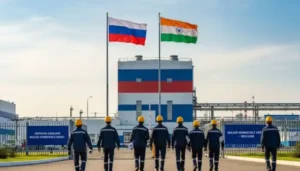In response to a widening industrial workforce shortage, Russia is actively seeking to recruit skilled Indian workers across key sectors including machinery, electronics, construction, and textiles.
India’s Ambassador to Russia, Vinay Kumar, confirmed the development in an interview with Russian news agency TASS, stating that Russian companies are increasingly turning to India’s skilled labour pool to meet production demands and sustain industrial output.
“Russia has a manpower requirement, and India has skilled manpower,” Vinay said.
He added, “Within the framework of Russian regulations, laws, and quotas, companies are hiring Indians”.
Labour Shortages in the Industrial Heartland of Russia
The Sverdlovsk region, home to Russia’s heavy industry and military-industrial complex—including major enterprises like Uralmash and UralVagonZavod—is among the areas most affected by the labour crunch.
Andrey Besedin, head of the Ural Chamber of Commerce and Industry, noted that the region urgently needs qualified personnel to ramp up production, especially as some workers have been deployed in the military operation in Ukraine and younger generations are increasingly reluctant to take up factory jobs.
He added that Russia expects up to one million foreign specialists, including a significant number from India, to arrive by the end of 2025.
To support this influx, a new Indian Consulate General is being established in Yekaterinburg, the capital of Sverdlovsk, to manage consular services and documentation for incoming workers.
Russia Expanding Beyond Traditional Sectors
Russian employers have traditionally hired Indian workers in construction and textile sectors, and they are now expanding recruitment into more specialised fields such as machinery and electronics.
This shift reflects Russia’s strategic need to maintain industrial capacity amid demographic challenges and geopolitical constraints.
The first wave of Indian workers began arriving in 2024, with initial placements at facilities like the Kaliningrad-based fish processing complex Za Rodinu, which faced acute labour shortages.
Regulatory Support and Labour Quotas
To facilitate foreign recruitment, Russia’s Ministry of Labour has proposed increasing the quota for qualified foreign workers by 1.5 times in 2025, raising the cap to 230,000 individuals.
The ministry estimates a workforce deficit of 3.1 million by 2030, underscoring the urgency of international labour partnerships.
Russia is also exploring recruitment from other countries such as Sri Lanka and North Korea, although officials have acknowledged that these processes are more complex and less scalable compared to India’s skilled labour supply.
Consular Services Under Pressure
The rising number of Indian workers has placed additional pressure on consular services. Ambassador Kumar highlighted the growing demand for documentation support, including passport extensions, birth registrations, and assistance with lost documents.
The embassy and consulates are preparing to handle this increased workload, with the new Yekaterinburg consulate expected to play a key role in managing administrative needs.
Strategic Implications
Russia’s decision to recruit Indian workers reflects a broader shift in its labour strategy, aimed at sustaining industrial productivity while navigating domestic workforce constraints.
For India, the move presents new employment opportunities for skilled professionals abroad and strengthens bilateral economic ties.
The initiative also signals a growing recognition of India’s human capital as a global resource, particularly in sectors requiring technical expertise and operational reliability.
Note: We are also on WhatsApp, LinkedIn, and YouTube to get the latest news updates. Subscribe to our Channels. WhatsApp– Click Here, YouTube – Click Here, and LinkedIn– Click Here.



